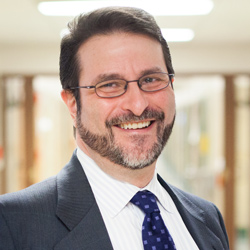Symposium Tackles Water Scarcity in the Middle East
Experts will explore potential sociopolitical and technological long-term solutions
An interdisciplinary group of experts will explore the wide-reaching ramifications of water scarcity in the Middle East as well as potential social, political and technological solutions to this critical issue at a public daylong symposium May 24 at Northwestern University.
“The Second Annual Symposium on Water in the Middle East and Israel: Regional Water Sustainability and Resilience” will take place from 9:30 a.m. to 4 p.m. in the Rebecca Crown Center’s Hardin Hall, 633 Clark Street, in Evanston.
Water scarcity drives conflict and leads to social instability, said Aaron Packman, director of the Northwestern Center for Water Research, one of the event organizers. Robust long-term solutions to water scarcity are necessary for stable societies in the Middle East, which is ground zero for this global threat because of an extremely limited water supply.

“Drought and the associated reduction in food production contributed directly to the civil war in Syria and thus to the global migrant crisis we face today,” Packman said. “This connection between water crises, food crises, civil unrest and large-scale involuntary migration has been identified by the World Economic Forum as one of the most pressing global threats over the next five to 10 years.”
In addition to the Water Center, the symposium is co-sponsored by the Crown Family Center for Jewish and Israel Studies in the Weinberg College of Arts and Sciences and the Buffett Institute for Global Research.
Six scholars will explore technological solutions to water scarcity, such as desalination and precision agriculture; the socio-political aspects of water security in the Middle East; and strategies for international cooperation to achieve water security, peace and health in the region while factoring the added complication of climate change.
Israel is the region’s leader in water management technologies, such as efficient irrigation and cutting-edge desalinization techniques, said Elie Rekhess, associate director for Israel studies in Weinberg. Water treaties forged in the mid-1990s between Israel and Jordan and Israel and the Palestinian Authority have produced significant cooperation between entities historically hostile toward one another.
Given that history, however, peaceful collaboration is always a challenge, Rehkess said.
“The continuous instability in the region and particularly the ongoing armed conflict between Israel and the Palestinians cast a shadow over regional collaborative efforts,” he said. “In Iraq and Syria, ISIS turned water installations into strategic weapons, threatening to flood vast areas, deny millions of basic water rights and displace entire populations.
“The international community, the United Nations, humanitarian NGOs and academic research institutes can — and should — play a major role in enhancing cooperative policy.”
Threats to water security extend well beyond the Middle East. While most Americans don’t think much about the issue when they turn on the tap, high-profile incidents like the Flint, Michigan, water crisis demonstrate the challenges of delivering clean water to large populations, even in developed nations.
“I think a lot of people are wondering if their city could be the next Flint, and they should wonder,” said Packman, professor of civil and environmental engineering at the McCormick School of Engineering. “It takes ongoing investment, constant vigilance and a lot of good engineers to ensure that we have safe and secure water supplies.”
Compounding the problem is the effect climate change has on the Middle East, already one of the most arid parts of the world. The stakes are high to develop more resilient water systems and use water more efficiently in the region, especially with the specter of climate-change induced changes in precipitation patterns looming.
“The Middle East is definitely getting hotter, which means more evaporation and less overall water available,” Packman said. “Predications of future precipitation in the region are uncertain, and any shifts will cause disruptions and, potentially, threats.”
Below is a list of presenting scholars and their topics.
- Hussain Amery, associate professor of international studies at Colorado School of Mines
Topic: “Threats to water security on the Arab Gulf States”
- Jean Cahan, director/chair, Norman and Bernice Harris Center for Judaic Studies at the University of Nebraska
Topic: “Explaining and resolving water security tensions in the Middle East: What can the humanities contribute?”
- Yoram Cohen, distinguished professor of chemistry and biomolecular engineering at University of California, Los Angeles
Topic: “Advances in water treatment and desalination technology in Israel: Regional and global benefits and challenges”
- Naftali Lazarovitch, professor at Ben-Gurion University-Negev in Beersheba, Israel
Topic: “Irrigation studies in arid environments: From measurements and models towards sustainable crop production” - Seth Snyder, water initiative leader at Argonne National Laboratory
Topic: “The state of technology for providing clean water”
- Neda Zawahri, associate professor of political science at Cleveland State University
Topic: “Adapting to climate change in the Middle East”